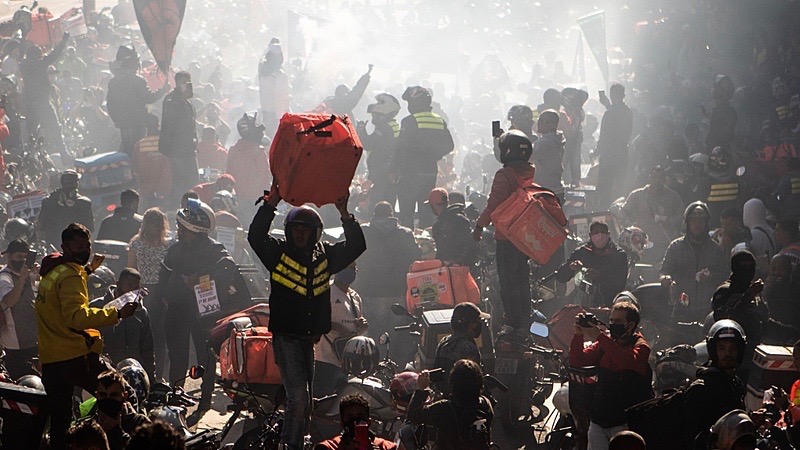OPINION

RODRIGO NUNES: IN BRAZIL, THE RIGHT CREATES PRECARIOUS WORKERS, BUT THE CYCLE CAN BE BROKEN
Thousands of Brazilian couriers organized pickets and protests across at least 60 cities, including São Paulo, where delivery services saw a sharp decline. This nationwide day of action marked a significant escalation in the couriers’ push for better pay and working conditions, a movement that began in 2020. Despite the scale of the protests, delivery companies have yet to respond to the workers' demands.
The Rise of Platform Work in Brazil
Between 2016 and 2021, the number of workers employed by delivery apps in Brazil surged by an astonishing 979.8%, with the sector now employing approximately 1.4 million delivery and passenger drivers. This boom coincided with Brazil’s economic downturn following the 2008 global recession, which culminated in the impeachment of President Dilma Rousseff in 2016. The subsequent austerity measures and labor reforms shifted the political landscape to the right, paving the way for far-right libertarian Jair Bolsonaro’s election in 2018.
The rapid expansion of platform work reflects Brazil’s long-standing tradition of informal and precarious labor, a legacy rooted in the country’s history of slavery. Sociologist Francisco de Oliveira described this phenomenon in the 1970s as an enabling condition for Brazil’s unequal capitalist modernization. Over time, neoliberal policies have exacerbated casualization, leading some thinkers to refer to this trend as the “Brazilianisation of the world.”
Political Implications of Precarious Work
The erosion of labor protections and rights has not translated into increased support for unions or left-wing parties. Instead, many platform workers became staunch supporters of Bolsonaro, blaming the Workers’ Party (PT) for the economic crisis that pushed them into gig work. This trend mirrors similar dynamics in Argentina, where precarious workers have gravitated toward Javier Milei’s laissez-faire policies.
This shift can be attributed to what some describe as “neoliberalism from below,” where individuals view themselves as entrepreneurs rather than exploited workers. This mindset helps them navigate a world where personal risk is the norm and self-esteem is tied to economic survival. From this perspective, government regulations—whether taxes, labor protections, or traffic laws—are seen as obstacles to economic activity. The loss of essential tools like cars, motorbikes, or phones becomes an existential threat, justifying heavy policing or even carrying weapons.
The Far Right’s Appeal to Gig Workers
The far-right’s pro-entrepreneur, anti-organized labor rhetoric resonates with workers in precarious conditions. Bolsonaro’s opposition to COVID-19 sanitary measures, for example, boosted his popularity among gig workers, while Argentina’s stricter approach under Alberto Fernández made workers more receptive to Milei’s laissez-faire policies.
Although Luiz Inácio Lula da Silva defeated Bolsonaro in 2022 to secure a third term, his administration faces challenges in reversing this tide. Inflation and lackluster economic performance have eroded Lula’s support among Brazil’s poorest, with approval ratings dropping by 20% in two months among those earning less than two minimum wages.
Survey Insights and Broader Social Shifts
A 2024 survey revealed that 67% of self-employed workers in Brazil would prefer formal contracts, with the figure rising to 75.6% among those earning minimum wage or less. Despite this, the attitudes of gig workers reflect a broader societal shift toward individualism and cynicism. Influenced by online coaches and the prosperity gospel of evangelical churches, many workers distrust collective solutions and accept survival struggles as natural and inevitable.
The cyclists and motorbike couriers weaving through Brazil’s congested streets symbolize this shift, serving as a bellwether for a society increasingly focused on individual survival rather than collective progress. As the gig economy continues to grow, the challenge for policymakers and labor advocates will be to address these deep-rooted issues while fostering a more equitable and inclusive labor environment.
"This represents a significant development in our ongoing coverage of current events."— Editorial Board









